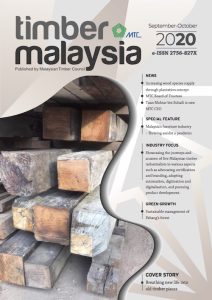About Bormill Wood
Affable and full of insights gained from over four decades of experience, Dato’ Lau Chen Nai, who had established Bormill Wood (Trengganu) Sdn Bhd in the east coast state of Terengganu shared his story and thoughts with us.
It all started in 1978 with Bormill providing kiln-drying services. “In 1982, we started to produce general mouldings and became one of the pioneers in Terengganu doing that,” he said.
Bormill supplied general mouldings to the Australian and Japanese markets. For the former, it was mostly general mouldings such as casings, skirtings and et cetera. “For Japan, we worked closely with several furniture manufacturers by supplying them stiles and heads for double-decked single beds, and table tops to another company there,” he said. “We used KSK (Kembang Semangkok), also Nyatoh, Sepetir and other species.”





Moving up the value chain
Subsequently, Bormill also went into manufacturing laminated scantlings focusing on the European market. “We use Meranti and supply mainly to Germany, France, Greece and Eastern European countries. Till today, we’ve been very successful in this as we supply to a regular chain of importers,” Dato’ Lau shared.
“Importers there would also buy from us to supply window and door frames to their customers,” he said. Besides Europe, Bormill had also exported Meranti engineered door jamb sets manufactured for the Australian market.
Bormill also ventured into manufacturing timber decking. He said outdoor decking using Yellow and Red Balau and Kapur are popular in countries like Germany, Denmark, France, Holland and Belgium.
“Many people in Europe love to spend a lot of time in their backyards. So, outdoor decking have been popular. Many also bought outdoor decking especially in the spring and summertime to sit outside,” he remarked, adding that backyards of hotels have wooden decking too. “Besides, Yellow and Red Balau have been widely used in jetties and decking around swimming pools.”
Other than outdoor decking, Bormill also supplies balcony and fascia boards, wall panelling and indoor flooring.
Today, Bormill’s key business us also in supplying truck ooring using mainly Keruing to the U.S. alongside their laminated scantling supply for the European window and door frame industry.
Sawntimber makes up 20% of their business while 80% involves the moulding component. They currently have 16 kiln drying chambers which have a capacity to process 1,500 m3 of sawntimber.
Sustainability that keeps on giving
Having been in the business for four decades, Dato’ Lau’s foresight and pioneering stature in the state and country’s timber industry have afforded him some acumens and ideas for the sustainability of the business.
Highlighting the country’s ‘green policy’ which helps preserve Malaysia’s forests’ sustainability, he said, “We have only harvested trees in areas that have been certfied under the Malaysian Timber Certification Scheme (MTCS) which is endorsed by the Programme for the Endorsement of Forest Certification (PEFC).
“Terengganu is not the only source of our MTCS/PEFC certified timbers as we also procur e such certified materials from other states such as Pahang.
“Alongside PEFC, the timber is also exported with Timber Legality Assurance System for Peninsular Malaysia (MYTLAS) licence, which is in compliance with the European Union Timber Regulation (EUTR)
Such licences and certification schemes help give our environment- conscious buyers the assurance that they seek besides ensuring the sustainability of the forest which our business depends very much on. This is also important for our future generations.
“Fifteen years ago, when a Singaporean radio channel team visited the east coast of Peninsular Malaysia, I told them, ‘ This is not a sunset industry’ and I still maintain today – it is not a sunset industry,” Dato’ Lau said confidently.
To further substantiate his statement, Dato’ Lau said the timber industry has so much more to offer.
One way is to look into more sustainable and innovative products as well as explore potential markets for lesser known species.
“Another way is to maximize the usage of the timber including residue from the factories.
“By valuing all parts of timber, we can increase our income, recover more material for wider usage and also in the process, provide jobs as well as contribute to environmental conservation,”Dato’ Lau said.
Debunking the 3D’s stigma
Supporting the environment also comes with how operations could be streamlined with the introduction of upgraded plant machinery.
“Beginning in the year 2017, we have planned to invest about RM5 million to improve our production with upgraded machinery and automation as well as green technology such as solar-generated electricity,” he said.
Upgrades can also lead to a cleaner working environment and less air pollution to comply with health, safety and environmental guidelines set by the local authorities,” he shared.
Up ahead, Bormill intends to enhance its presence in the Japanese market with its high precision cut quarter-sawn timber using a pony saw, which the Japanese prefer,” he said, adding that they’re also keenly eyeing the growing indoor flooring market in China.
There may be uncertainties especially with the market adversely affected by the COVID-19 pandemic, but ever the optimist, Dato’ Lau said with a ‘smile’ in his voice, “We will take the challenge!”



